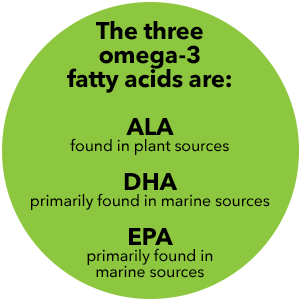The Food and Mood Connection

Macey – RDN, LD
We are finally getting to the time of the year when the days feel longer, and we are seeing more sunshine. I don’t know about you, but I definitely notice a positive change in my mood during this time of year.
Speaking of mood, May is Mental Health Awareness Month. More, now than ever, we are shining a light on the important topic of mental health. With that, I wanted to discuss the connection between diet and brain and mental health.
 When it comes to the overall health of our brains and our day-to-day mood, what we eat can make a difference. Though there is no singular nutrient that is the answer to all things brain health, there are some nutrients we know to have a positive impact on the health of our brains. Today, I wanted to focus on one nutrient in particular—omega-3 fatty acids. We know that our brains need the omega-3 DHA to function optimally. In fact, the brain is largely made up of fat, with DHA being a very prevalent component.² With it being such a prominent portion of the brain, we must continue to replenish it through dietary intake of more DHA. Not only do omega-3s play a role in makeup of our brains, there is also evidence that adequate omega-3 intake may decrease the risk of depression¹ and cognitive decline.4 Knowing all of this, it only makes sense for us to bring this nutrient to the conversation of diet and brain health. With that, here are four foods you can incorporate into your diet to increase your intake of omega-3 fatty acids.
When it comes to the overall health of our brains and our day-to-day mood, what we eat can make a difference. Though there is no singular nutrient that is the answer to all things brain health, there are some nutrients we know to have a positive impact on the health of our brains. Today, I wanted to focus on one nutrient in particular—omega-3 fatty acids. We know that our brains need the omega-3 DHA to function optimally. In fact, the brain is largely made up of fat, with DHA being a very prevalent component.² With it being such a prominent portion of the brain, we must continue to replenish it through dietary intake of more DHA. Not only do omega-3s play a role in makeup of our brains, there is also evidence that adequate omega-3 intake may decrease the risk of depression¹ and cognitive decline.4 Knowing all of this, it only makes sense for us to bring this nutrient to the conversation of diet and brain health. With that, here are four foods you can incorporate into your diet to increase your intake of omega-3 fatty acids.
1. Seafood, specifically fatty seafood
Though seafood may be the first food to come to mind when we talk omega-3s, not all seafood is a great source of omega-3s. Use the acronym SMASH to remember the best seafood-sources of omega 3s.
S – Salmon
M – Mackerel
A – Anchovies
S – Sardines
H – Herring
2. Nuts
Walnuts are the only tree nut that is an excellent source of ALA. Pecans, pistachios, macadamia, and pine nuts, among others, also contain ALA.
Tip: sprinkle nuts on your salad, add them to oatmeal and baked goods. The options are endless!
3. Seeds
Flax and chia are both sources of the omega-3 ALA.
Tip: Add to smoothies, salads, oatmeal, baked goods and more!
4. Oils
Canola oil and soybean oil provide the omega-3 ALA
Did You Know?
ALA is the only omega-3 that is considered essential, meaning our body cannot produce it so we must obtain it from our diet. Our bodies can make DHA and EPA from ALA but it’s a very inefficient process. That’s why it’s so beneficial to ensure adequate dietary intake of all three omega-3 fatty acids!
Ready to incorporate more omega-3 rich foods into your diet? Here’s some recipe inspiration to get you started!
Macey Hurrle, Registered Dietitian
RDN, LD
Do you have nutrition-related questions? Ask our team of Registered Dietitians here!
 Don’t miss out! Catch up on all the latest blogs from our Dietitian Team.
Don’t miss out! Catch up on all the latest blogs from our Dietitian Team.
Cited
1. Bachman C. Fish is Brain Food | Seafood Nutrition Partnership. Published June 13, 2023. https://www.seafoodnutrition.org/research/dietary-guidelines/fish-is-brain-food/
2. Omega 3’s and Brain Health | Always Omega 3’s. https://alwaysomega3s.com/why/brain-health.
3. Omega 3 Fatty Acids | National Institute of Health. Published February 15, 2023. https://ods.od.nih.gov/factsheets/Omega3FattyAcids-HealthProfessional/
4. Two omega-3s in fish oil may boost brain function in people with heart disease | American Heart Association. Published on November 8, 2021. https://www.heart.org/en/news/2021/11/08/two-omega-3s-in-fish-oil-may-boost-brain-function-in-people-with-heart-disease














